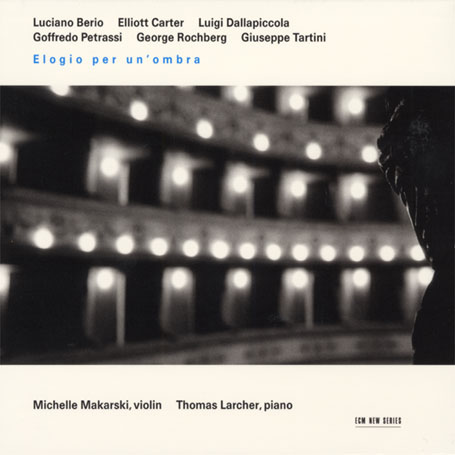Elogio per un'ombra
A programme of works united by the Italian connection yet well differentiated through Makarski’s subtly varied approach
View record and artist detailsRecord and Artist Details
Composer or Director: Elliott (Cook) Carter, Luciano Berio, Luigi Dallapiccola, Giuseppe Tartini, Goffredo Petrassi, Anonymous
Label: ECM New Series
Magazine Review Date: 2/2001
Media Format: CD or Download
Media Runtime: 65
Mastering:
DDD
Catalogue Number: 465 337-2

Tracks:
| Composition | Artist Credit |
|---|---|
| (2) Pezzi |
Luciano Berio, Composer
Luciano Berio, Composer Michelle Makarski, Violin Thomas Larcher, Piano |
| Riconoscenza per Goffredo Petrassi |
Elliott (Cook) Carter, Composer
Elliott (Cook) Carter, Composer Michelle Makarski, Violin |
| (2) Studi |
Luigi Dallapiccola, Composer
Luigi Dallapiccola, Composer Michelle Makarski, Violin Thomas Larcher, Piano |
| Elogia per un'ombra |
Goffredo Petrassi, Composer
Goffredo Petrassi, Composer Michelle Makarski, Violin |
| Sonata No. 7 |
Giuseppe Tartini, Composer
Giuseppe Tartini, Composer Michelle Makarski, Violin |
| Lamento di Tristan |
Anonymous, Composer
Anonymous, Composer Michelle Makarski, Violin |
Author: Fabrice Fitch
‘Europe’s premiere post-modern label’: that might be ECM’s slogan – or so one might think, reading through the contents of this and other instrumental recitals it has brought out in recent years. Actually the eclecticism is belied by a number of links, some audible, others not. One is the obvious Italian connection, spanning the centuries across ‘the first piece of Italian instrumental music’ (the Lamento di Tristan) to Dallapiccola, Petrassi and Berio; another is the kinship of Carter and Rochberg to these figures (especially the first two) at one time or another; and a third is the variation structure and violinistic preoccupations of the Tartini Sonata, which also informs the neo-tonal materials and explicitly idiomatic writing of Rochberg’s Caprice Variations. To some extent, as I have said, these are ‘paper links’, yet there is no doubt that the whole hangs together very convincingly.
Makarski varies her playing styles deftly; that is one of the principal challenges of this sort of recital. In the Tartini she is fluid and unobtrusively virtuosic; the second of Dallapiccola’s studies has the grandiloquent weight that the fugal ‘subject’ seems to demand (though I confess that the overall effect of the piece is not to my taste). The three modernist pieces are well controlled (with Thomas Larcher a secure accompanist in the Dallapiccola and Berio pieces), the harmonics nicely in place (try the first of Berio’s Due pezzi after the four-minute mark), intonation and tone quality appropriately varied; Rochberg’s neo-romanticism elicits the requisite warmth and contrasts well with the vielle-like whiteness and straight tone in the concluding Lamento. In that sense (and quite apart from any ideological considerations) the recital offers a variety which a stylistically uniform programme might struggle to achieve. Indeed, the unlikely juxtapositions tell us something about the continuity of string-playing down the ages, and puts the modern pieces (dare I say it) in a rather conservative light! Very clear sound-recording and strong presence.'
Makarski varies her playing styles deftly; that is one of the principal challenges of this sort of recital. In the Tartini she is fluid and unobtrusively virtuosic; the second of Dallapiccola’s studies has the grandiloquent weight that the fugal ‘subject’ seems to demand (though I confess that the overall effect of the piece is not to my taste). The three modernist pieces are well controlled (with Thomas Larcher a secure accompanist in the Dallapiccola and Berio pieces), the harmonics nicely in place (try the first of Berio’s Due pezzi after the four-minute mark), intonation and tone quality appropriately varied; Rochberg’s neo-romanticism elicits the requisite warmth and contrasts well with the vielle-like whiteness and straight tone in the concluding Lamento. In that sense (and quite apart from any ideological considerations) the recital offers a variety which a stylistically uniform programme might struggle to achieve. Indeed, the unlikely juxtapositions tell us something about the continuity of string-playing down the ages, and puts the modern pieces (dare I say it) in a rather conservative light! Very clear sound-recording and strong presence.'
Discover the world's largest classical music catalogue with Presto Music.

Gramophone Digital Club
- Digital Edition
- Digital Archive
- Reviews Database
- Full website access
From £8.75 / month
Subscribe
Gramophone Full Club
- Print Edition
- Digital Edition
- Digital Archive
- Reviews Database
- Full website access
From £11.00 / month
Subscribe
If you are a library, university or other organisation that would be interested in an institutional subscription to Gramophone please click here for further information.




